| Srl | Item |
| 1 |
ID:
087312
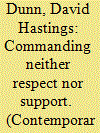

|
|
|
|
|
| Publication |
2009.
|
| Summary/Abstract |
One of the often repeated malapropisms of George W Bush was his claim that he was misunderestimated. A more accurate observation would be that the Bush administration was often misunderstood in its own approach to the outside world.
|
|
|
|
|
|
|
|
|
|
|
|
|
|
|
|
| 2 |
ID:
068848
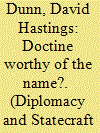

|
|
|
| 3 |
ID:
083992
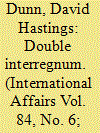

|
|
|
|
|
| Publication |
2008.
|
| Summary/Abstract |
The downturn in relations between the UK and the US under the premiership of Gordon Brown presents an interesting opportunity to analyse the nature of the relationship between the two states. Brown's policy of creating distance between his approach and that of his predecessor, Tony Blair, and between himself and President Bush, offers a case-study in whether it is possible to be cool towards an incumbent leader while remaining close to the state he leads. In other words: is it feasible to be anti-Bush and pro-American? It also provides an opportunity to analyse the role of political timing in inter-state relations. By appearing driven by reaction to the events of 2003 despite taking office in 2007, Brown put himself out of step with the prevailing mood of the time. By also acting as if the Bush administration was a lame duck counting out its time to retirement in 2009, Brown allowed himself to be outmanoeuvred in his bid for America's attention by the conciliatorily pro-American new leaders of France and Germany. By acting as if the Bush administration is a political interregnum, the Brown government has invited the United States to treat his own administration the same way. The result is a dual interregnum in UK-US relations, with each incumbent leader awaiting the political demise of the other before better relations can be resumed.
|
|
|
|
|
|
|
|
|
|
|
|
|
|
|
|
| 4 |
ID:
123890
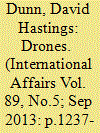

|
|
|
|
|
| Publication |
2013.
|
| Summary/Abstract |
The Obama administration's controversial use of drones in Afghanistan, Pakistan and Yemen has made the subject a hot topic of political and academic discourse. While most of this debate has focused so far on the legal, ethical and prudential use of large armed aerial vehicles, this article seeks to address the potential wider impact of this new technological innovation.
The article argues that drones constitute a new and disruptive technology not just in the way that they have been used to enable a new form of counterterrorism. Instead, it argues that drones pose a new form of terrorist threat against the West which is at present under-analysed, unarticulated and underestimated.
Part of the reason for this underestimation is the failure to appreciate the scale and scope of drone use for commercial purposes which is about to unfold. Technological innovation now means that drones will be capable of many jobs currently performed by small planes and helicopters, but more cheaply and easily - in addition to many other new applications.
The proliferation of this cheap and easily available technology will make its application for terrorist use easy to achieve and difficult to counter. The ability of drones to penetrate traditional defences and established conceptions of what constitutes a plausible threat is a challenge which so far has gone unheeded. This article seeks to challenge that complacency.
|
|
|
|
|
|
|
|
|
|
|
|
|
|
|
|
| 5 |
ID:
088649
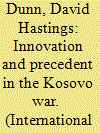

|
|
|
|
|
| Publication |
2009.
|
| Summary/Abstract |
The 1990s was a period of strategic innovation in US foreign policy. Operation Allied Force in particular represented an important step in the contorted evolution of America's attitude towards the use of force in the post-Cold War period. That operation demonstrated the growing influence of humanitarian concerns and the extent to which America was willing to reconsider Cold War criteria on the prudence and utility of force in support of its foreign policy. In its decision to intervene in Kosovo, the Clinton administration also divided opinion among the military. This, in effect, reduced the premium placed on the counsels of the armed forces and made it easier for the Bush administration subsequently to ignore their advice. Furthermore, having fought the war multilaterally through NATO, Operation Allied Force made America more wary of doing so again. In other words, the intervention set a number of precedents and left a significant legacy for the way in which US foreign policy was pursued in the decade that followed. This legacy is considered in two parts: the first analyses those issues associated with the use of force debate; the second considers how the Kosovo experience affected US attitudes to coalition warfare.
|
|
|
|
|
|
|
|
|
|
|
|
|
|
|
|
| 6 |
ID:
061791
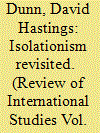

|
|
|
| 7 |
ID:
068634
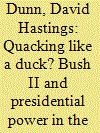

|
|
|
| 8 |
ID:
076517
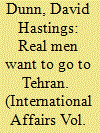

|
|
|
|
|
| Publication |
2007.
|
| Summary/Abstract |
The desire for regime change in Iran has coloured the Bush administration's approach to the challenge presented by Tehran's apparent desire to build a nuclear weapons capability. Yet the threat of military force either to destroy Iran's nuclear infrastructure and/or to eff ect regime change has proved counterproductive to the simultaneous eff orts to stop the Iranian programme through diplomacy. Indeed, the entire Bush policy towards Iran of simultaneously wishing to coerce, undermine and replace the regime while also seeking to persuade it to abandon its nuclear programme through diplomacy has proved both strategically inconsistent and consistently counterproductive. In failing to decide whether it prioritizes a change of regime or a change of behaviour it has got neither. This article elucidates the rationale behind the Bush administration's policy approach, demonstrating how in seeking both objectives simultaneously it has achieved neither. It sets out instead a set of policies to regain the initiative in US-Iranian relations and to prioritize and coordinate American policy goals within a broader Middle East policy.
|
|
|
|
|
|
|
|
|
|
|
|
|
|
|
|
| 9 |
ID:
096515
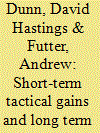

|
|
|
| 10 |
ID:
104146
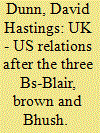

|
|
|